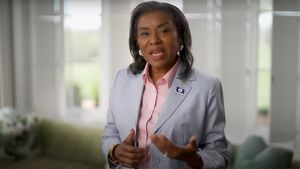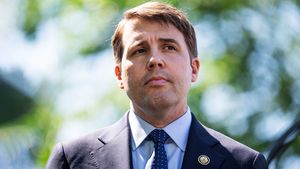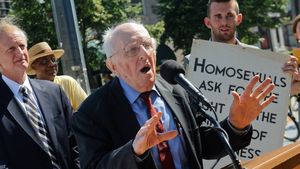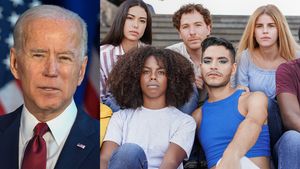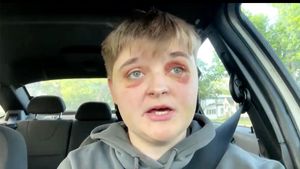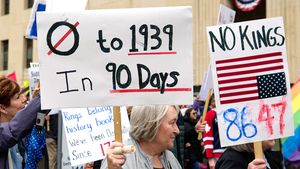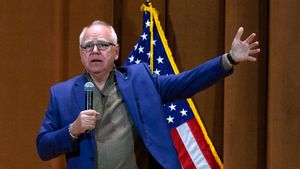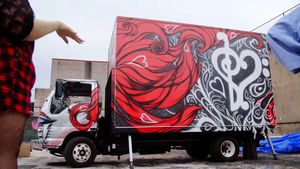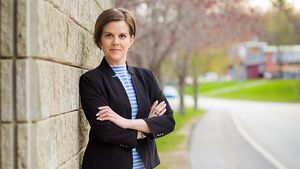Jim Parsons gives an emotional, intelligent, elegantly restrained performance in the new Silas Howard film A Kid Like Jake. Parsons plays Greg, husband of Alex (played by Claire Danes) and father of the titular character, a 4-year-old who is beginning to show personality traits suggesting he's gender non-conforming or trans.
The film examines the nuances and conversations surrounding raising a gender expansive child, and doesn't shy away from showing how even the most liberal, open-minded of parents can struggle to find the right words to navigate how to raise a child whose gender may not be cookie-cutter clear.
Related | A Kid Like Jake Director Silas Howard Wants to Explore the Ambiguity of Identity
While chatting with Parsons, we asked his opinion on the issue of straight actors consistently getting cast in mainstream gay roles, and why he thinks "you can never oversaturate representation for people who have been underrepresented, in film."
Take a look at the trailer for A Kid Like Jake, in theaters tomorrow, and then read our interview with Parsons below:
How's you're press day going?
JP: It's fun. It's really nice when you're able to do a project that at a deep level you feel strongly about, whether it's quote unquote 'important,' or just important to you, artistically, to be a part of, and this was both for me. But when you do, the press days are so much easier, because you can talk about it.
I understand your production company had acquired this project before attaching a director at all?
JP: A couple of years before, yeah. Jenette Kahn, and her company, Double Nickel, who are also producers on this, we had a relationship with them, as an actor, in my case. I don't know if she'd seen the play version of A Kid Like Jake, or just read it, but in any case, she at some point said 'This could be a smart movie. You might like it. It's a smaller cast. It's contained. It's not, like, running to Europe. It could be a nice way to dip your toe in.' And she sent it over, and she was for sure to right about that--it was a smaller scale, and manageable, but more importantly I just loved it so much.
What specifically drew you to the film?
JP: As much as you can't separate the current topic of gender fluidity, and possible transness maybe coming from this child--that's there, and that's important and one of the reasons why I loved it--but it really was much more just these well-drawn human beings and the conversation and arguments they were having. Daniel (Pearle) has such an ear for the way people talk, and the way people fight. That's a real art, and a real skill, and as an actor, while if the topic is not meaningful it's not worth talking about, even if it's meaningful if it's not written in a way that you want to sink your teeth into it and have those arguments, it's also not worth it. So this was a case of both, and as much as I wanted to produce it, part of it was that if this got made, I so desperately wanted to play that character. It would have made me very sad to let someone else say those words.
Photo by Jon Pack, Courtesy of IFC Films.
I'm getting chills thinking about the fight scene that happens between you and Claire. You said Daniel has such an ear for fights--does that mean none of it was improvised at all?
JP: None of it. It's so natural, every interruption, every little word and name thrown in was all written and choreographed in that way, vocally. Claire and I were just at a thing for Vulture Fest, and they showed a clip of that fight, and both of us were like, 'Oh!' As hurtful as those characters are being to each other in that moment, as actors we were both sad that we couldn't do it again. She was like, 'The idea that there were two people in the play who got to do that, night after night. And feel those differences in what a line can make...' It's really exciting. But it's really a testament to well-crafted dialogue, on the part of the writer. Because that's an actor's bread and butter, when it's good.
Do you feel like you had to prepare yourself mentally beforehand to get into those scenes?
JP: They placed that scene on the schedule later into the shoot. I know that that's not always possible--some movies you have to start off with the climactic scene. We didn't have to do that, and that in and of itself was a big chunk of the preparation. Claire and I had developed a relationship by then, we'd worked with the cinematographer, we'd worked with Jake. With Octavia. We had a lot of information behind us. But really, more of the preparation was, as I memorized, and sang those words to myself around my apartment for the few days leading up to that scene, I knew that there had been talk of taking two days to shoot that scene, because it's very long. But first, the way it was shot, it was a steady cam that followed us around, which helped. We could move around, we didn't have to do a thousand different setups to get this angle and that, which was a big relief in a scene like that where you want to be engaged the whole time. That can get tiring. The other thing was, Claire and I both came in really prepared for it and ready to do it and I remember we sat down with Silas (Howard) to just kind of do a line through. And it just fell into place sitting there, and it was like, 'OK, let's go finish hair and makeup and start shooting.' For this particular character and this story, I give equal credit again back to to the writing. It was easy to wear. When you're saying the words, they just have an effect on you. You can't say certain words to people without going, 'Oof.'
Have you had a working relationship with Claire before this film?
JP: No, we'd never met. Or maybe on a red carpet somewhere--industry events are so weird. You meet so many people and then you go, 'Did we meet?' No, I'd really loved Claire so much for so long, because she'd been working for so long, long before I'd been in the public eye. She's an icon. Everybody knows who she is. And I always felt like I really wanted to work with her. I wanted to play this part, and so the goal in my head became, 'Who would match well with me? Who could I have these discussions with?' She was really one of the first people that came to mind. But with all that, you really don't know what it's going to be like until you're in a room together. I don't think most actors are a lot different than what you'd think--if you've seen them, and you guess they're probably nice in real life, or, say, a really sexual being in real life, they usually tend to be. But not always. In this case, she had plenty of surprises, too, I don't mean to make her boring-sounding, but she was what I thought she would be, on so many levels.
Photo by Jon Pack, Courtesy of IFC Films.
She seems so nice.
JP: She is. She's very nice, and she's very... I hate to use the world 'normal,' because it's such a weird word, but she is. She and Hugh have a very healthy marriage, they have Cyrus, she's pregnant with another child right now... as much as you can be, and be in the entertainment industry, she really has a regular life. TV also affords that. She's been on Homeland for several seasons now, and that allows you a more average working schedule than someone who is having to hop all over the globe for this shoot and that shoot. Although she is all over the globe with that, but at least her schedule is regimented. And I think we both had that in common, with me doing my show for so many years, we were both accustomed to a certain... and our window for working on outside projects was the same.
I had just watched an interview you did, where you talk about Love, Simon. I thought it was cool how you'd said...
JP: Yes, without passing judgment on the movie at all, it really was... There were rumblings that people had said, 'Is it too late? Are we past this?' And I thought, my two-layered thing on it was: number one, I don't think in every, or perhaps even most parts of the country, to this day and age, is this too late. I think if you happen to live in New York or in LA or several other bigger metropolitan areas, yeah, you can find a real--even growing up in Houston in the 90s, like I did, and going to gay bars--there was a real gay scene that I could be a part of, and go out in, and feel comfortable in public without being looked at in any weird way. Which is important to feel, to be able to begin to express yourself and figure out who you are and who you love. So in that way, number one, I don't think it's too late for a movie like this.
But the second part, and this is what I got into on Colbert, is how many repeated straight romantic comedies have we had to watch over the years? Or gotten to watch, because I brought up When Harry Met Sally, which is a wonderful movie. But we only have that movie because nobody stopped and said beforehand, 'Who needs another straight romantic comedy?' They didn't let that get in their way, and that, as much as anything, is what I'm looking forward to if we keep pressing in this direction. Is more great films that happen to be a gay romance. But if we act like we don't need it, and the only reason to make them is because we need it, then that's not the point. And I don't think, too, you can never oversaturate representation for people who have been underrepresented, in film. Whether that's race or gender or sexual orientation. Let there be no doubt, there's been less representation of certain groups of people. So the more the merrier, as far as that goes. Even in a mediocre film, even in a bad film, there will be a nugget that someone can hold on to.
I'm interested in your thoughts on how the guy in Love, Simon--not passing judgment on the film or on his performance--the fact that he's a straight actor. That seemed like such a good opportunity to have a queer actor take on the part. For you, who've been in the business awhile, seeing the scarcity of these roles... I wonder your thoughts.
JP: I'm of two minds, because I feel that I do completely understand and agree with the idea that if there is a prominent leading gay role like that, and there is undeniably a talented gay actor who would be right for the role, it is ultimately a wonderful thing to have them play it. Speaking only as an actor, though, this is where I say I'm of two minds--it's hard to find the dividing lines of where we stop letting actors play people who aren't completely themselves. I think of a famous case, that's just something we don't do anymore: Mickey Rooney playing... was he Chinese in Breakfast at Tiffany's? Something like that... we don't do that anymore, and I don't think anybody is going to argue that we should start doing that again. So maybe we are evolving to what we're talking about, but I'm just not sure. If that's the case, I shouldn't be playing a straight person, like I am in this movie. But you know what, and this goes back to the movie--these people, with Jake, who are fumbling with what words to use, and how to approach it... we can't deal with topics that are so important to people and just have it be clean and easy. Even the most well-intentioned is this fumbling towards perfection. Failing upwards.

























